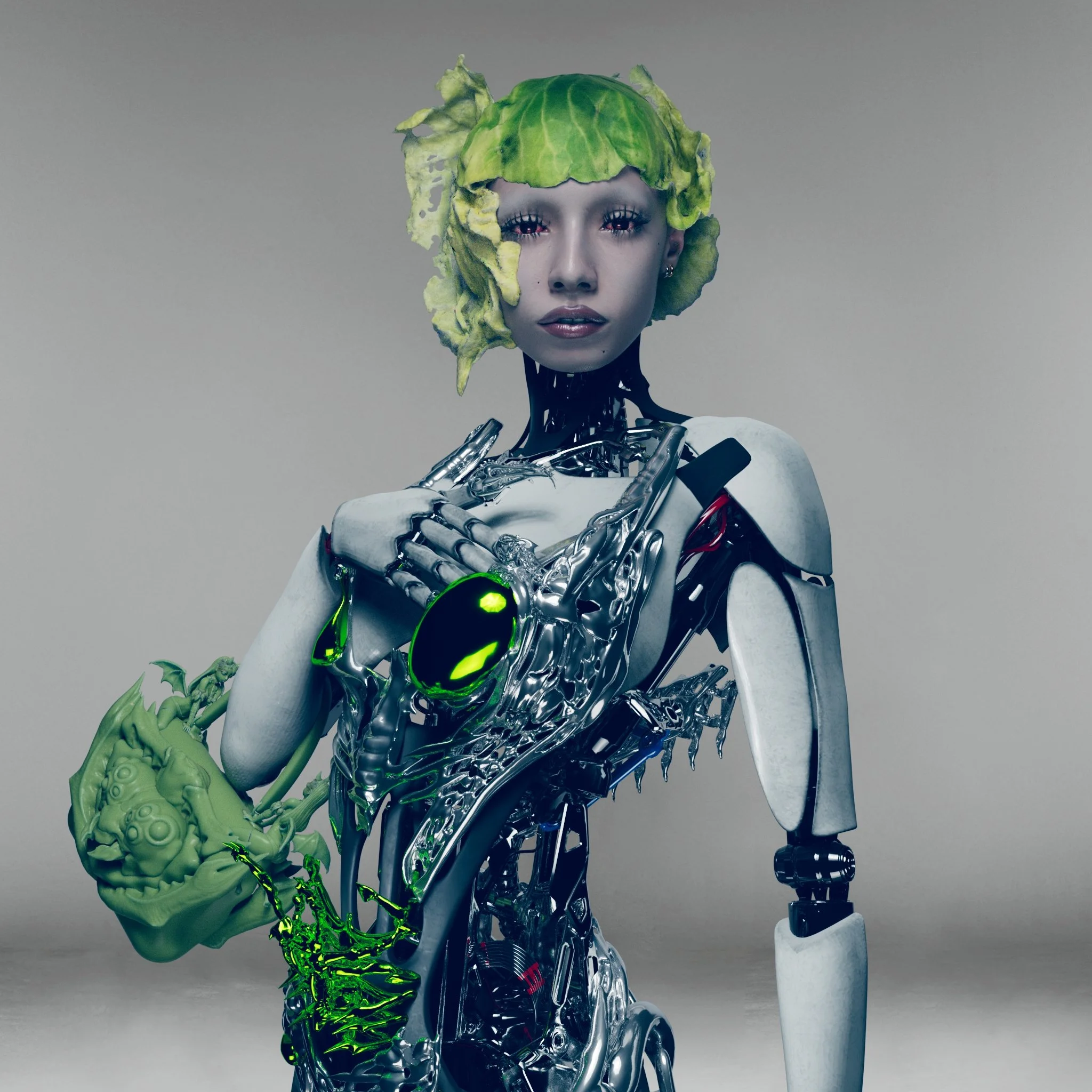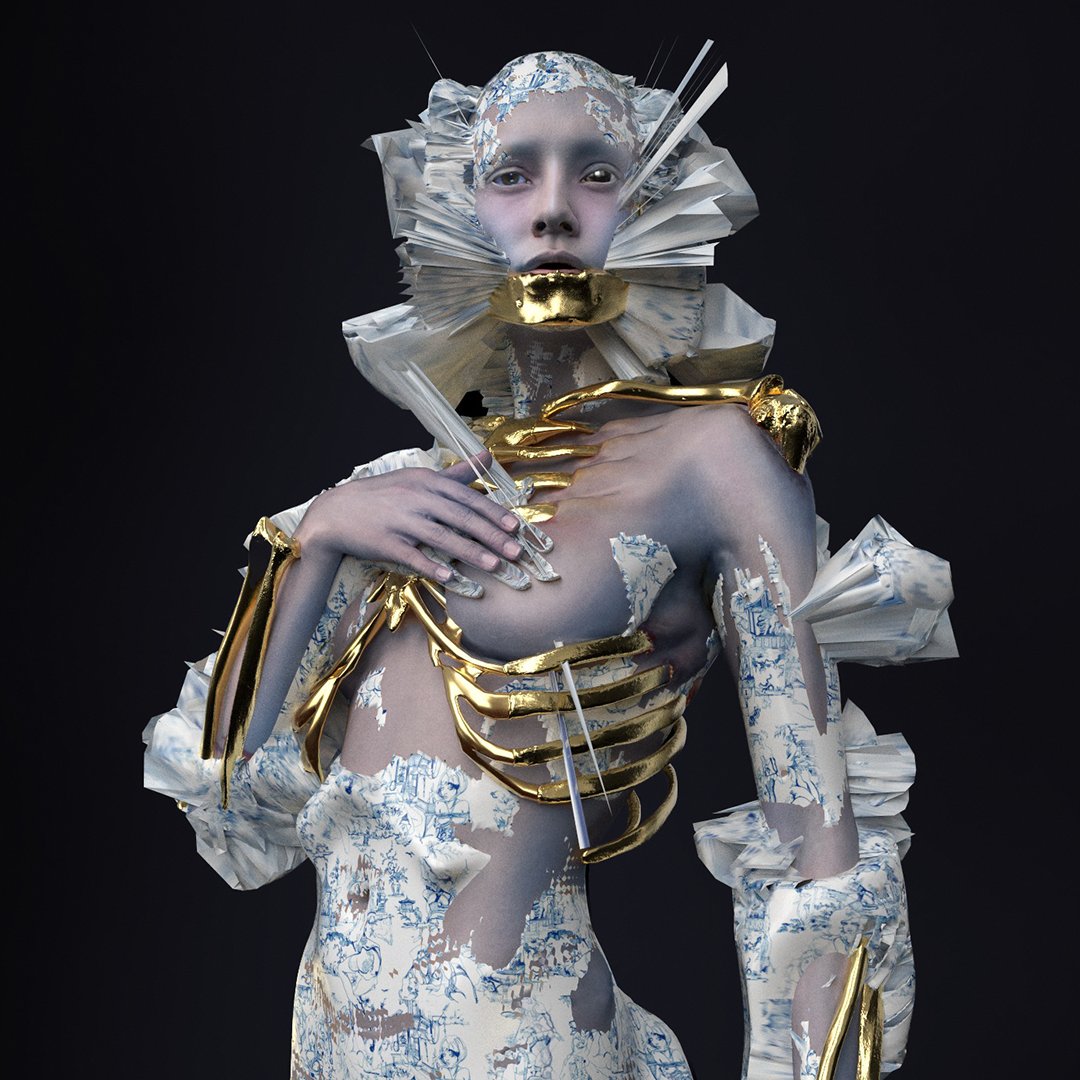
Nick Knight on Embracing AI in Art
aiart
In a recent interview with the Victoria and Albert Museum, Nick Knight shared his thoughts on AI—views that stand in sharp contrast to the prevailing anti-AI sentiment in the art world.
While reading through the comments on his post, I was struck by how thoughtfully and patiently Nick engaged with his critics. My own views are closely aligned with his, but I found that he articulated them with such clarity and authority that I wanted to preserve his responses here.
vamuseumAI
AI is changing the essence of photography or redefining it for a new era? For over four decades, Nick Knight has been at the forefront of image-making, pushing beyond the limits of the camera and exploring new possibilities in film, AI, and virtual realities. Here, Knight offers his perspective on the controversies surrounding generative AI and its use as a tool for artistic creation. He argues that those who care deeply about art, culture, and humanity should play a central role in shaping its future. Discover thought-provoking and inspiring photography at our Photography Centre in V&A South Kensington.
Transcript: Nick Knight on AI
The debate that rages around AI at the moment is interesting from a historical point of view because it’s very similar to the debate that raged around photography when photography was first born.
And the sort of, you know, the painters were sort of very dismissive of photography — it’s just a mechanical process, how can photography possibly emulate the poetry of the human mind or the human soul?
Which of course we’ve proved, hopefully for the last 200-odd years, that photography is capable of that same sort of thing.
You hear the same things around AI — it’s just a mechanical thing, it’s just an algorithm. It isn’t. It’s still down to choice, still down to curation, still down to the prompt — still down to all those sorts of things.
“Oh well, it’s just plagiarizing where it’s gone in the past.” That’s what virtually every artist does. You know, you walk around the Louvre or the V&A — you’ve taken bits of Byzantine art or bits of the Pre-Raphaelites or a bit of modern design or whatever it is — and they’re all references that go into your mind. Some you like, some you hate, and that’s what guides you when you’re creating imagery.
I also think you have to think — what would Man Ray have done with ChatGPT or Midjourney or DALL·E Mini or whatever? You know, these were photographers who wanted to manipulate life.
Once you have Blumenfeld — he would have been classic for rushing off into his Midjourney and prompting it away and then putting his pictures in. You can imagine those guys would have been thrilled to be able to work in that way.
I’m incredibly positive about the state of our culture and the state of AI and the state of the new media that are happening through it. It’s the most exciting age you could possibly live in.
Comment Highlights
Erik Lee Snyder → Nick Knight
I enjoy your insight but it’s easy to have this point of view when you’re a wealthy famous artist who’s late in your career. Although I do agree with you on a number of points, you can’t turn away from the massive job-loss for the entire creative industry.
Nick Knight → Erik Lee Snyder
hi, just wanted to say, I honestly feel I’m just beginning!
Also it’s not a career in my opinion, it’s my life.
Hope that makes sense :)
modamotion.fashionfilmproject → Erik Lee Snyder
That was really harsh, and clearly spoken from an extremely jealous heart.
Erik Lee Snyder → modamotion.fashionfilmproject
it wasn’t my intention to be harsh in any way and I hold zero jealousy. Nick is a brilliant and extremely accomplished artist who I’ve been a fan of for decades. There’s just more to this very heated issue and my concern is for all of the people in the creative industry who are already feeling the strain of this technology.
Apologies to @nick_knight if my words came off harsh in any way 🙏🕊️
Nick Knight → Erik Lee Snyder
hi, absolutely no need to apologise. I totally realise this is a very emotive subject and I do try to understand all the different points raised against the use of AI. I totally respect your opinion and all those expressed here, but I fear that many people do not know have much or any knowledge actually trying to create anything interesting and or new and worth looking at.
However if we don’t experiment how can we advance. AI is in every device you work with, your phone camera, even your sat nav or your weather app, the views you see of Mars!!. Also medicine is having great breakthroughs due to AI, so the question is do we just say artists cannot work with it but every other profession can ?
Also if we as artists turn our backs on it, then it won’t go away, then it will be the military and big business who push it and shape our world with it, a world based on killing and greed is what we already have, I am hoping the future could be different, but artists need to shape that world!
Sorry, don’t mean to go on ! Thanks, Nick
Jason L. Nelson → Nick Knight
You fail to mention the massive multinational corporations that are sure to— (truncated in screenshot but contextually referencing corporate control of AI.)
Nick Knight → Jason L. Nelson
hi, you raise a good point, but that’s why artists of all types must be in this, to shape it for art and not just for profit. Artists turning their backs on AI will not stop it but just allow the huge corporations to put everything behind firewalls or develop it simply as a way of saving money and making money.
AI is here and will shape our culture, at the moment it’s being driven by big business and the military, I don’t want a future shaped by greed and killing… we already have that and it’s really not great, so that’s in part why I talk about it.
I hope that helps explain my views a bit more.
notmyfckingtempo → Nick Knight
Nick, you are parroting the same faulty reasoning that all frustrated wannabes use to justify this nonsense.
Why has anyone yet to present a single use case of what genAI can do that could not have been achieved in any other way beforehand?
What sort of artistic expression or endeavor does this enable that wasn’t already possible in ways which are as complex and developed as it gets?
Nick Knight → notmyfckingtempo
hi, I understand however how can we create with AI if we cannot experiment? It’s been around since the 1950’s but only in the last few years has been easily accessible.
It’s in every image you take in your phone, it’s in your sat nav, do you want it taken out of use completely, so no AI in medicine or law? Or just taken out of art?
notmyfckingtempo → Nick Knight
Hi Nick! I appreciate the engagement and the time you took to reply. Apologies in advance for the long-ish comment… (continues offscreen)
Vincent Peters → Nick Knight
I deeply disagree with you on this one Nick. AI is not a technical device like a camera.. it decapitates the photographer and the artist - it makes decisions for you. There is no creative struggle. No self revelation - no self -It doesn’t reflect your experiences all those perceptions that you accumulated in your life that will appear in the process of photography. Already the computer is reducing the beauty of the intuitive moment and what it reveals about your reaction and why does everybody react differently. Because everything comes from something. Something that you felt something that you’ve been through somebody you loved somebody you lost.. photographs reveal something about you. it’s a renaissance of all your perceptions, -Especially you! Think about Carl Gustav Jung theory of the anima and the animas. A hidden mythology of women and your female side that you carry that has been uncovered in photography. and you think the computer can reach any of these?
Nick Knight → Vincent Peters
hi Vincent, this is not how I work with AI. I will work to create an abstract image in one AI by feeding it contradictory prompts and prompts that have no logic. This process can take hours and I get shown 1000s of images , I am permanently altering the words in the prompt to see how they can be used to affect the image but it’s a very long process and you pull on all your knowledge of art and your imagination to create the prompts , once I have a batch of abstract images I like I feed them into another AI and ask it to rationalise them. This prompting and reprompting takes hours even days before you get something you like. I take the images from this section of the process and then make yet another AI make the still images move and so on. I also ask the second AI to create a 3 dimensional object from the rationalised abstracts, this I then 3D print. I have to choose the material it’s printed in …. Titanium? Alabaster ? Lead ? Bitumen ? Etc. The reason I say this is because there is just as much reliance on my imagination, my choices and most importantly what I’m trying to say with the piece. I do hope that helps explain.
I work with a whole range of different people from printers to musicians cgi artists to retouchers to models and so many more, so the idea that it’s just me and a computer could hardly be further from the truth.
Can I give you another example? I am making a series of sculptures using natural materials such as wood and honey, flint and lard, which I then scan and photograph, I then put the pictures through an AI, prompt it with prompts that contradict the materiality of the objects I have assembled and photographed and then ask the AI to create a printable 3D object OR a poem inspired by the objects and then I use that as prompts to feed into another AI.
It’s all so new, that it’s hard to know the parameters of what we are doing without testing and trying things.
I have a camera that when I point it at an object it creates a poem of the scene in front of it not an image…
Anyway sorry Vincent I’ll stop going on. Maybe come for a tea and a chat at SHOWstudio :)
